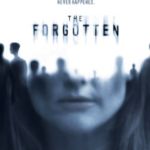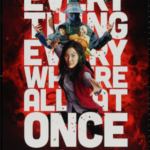Children of Men (2006)
This is a dystopian story, set in the not-distant future, about an England in which, as in the rest of the world, no children have been born for the last 18 years. For an as yet unknown reason, women have become unable to bear babies. Bereft of offspring, societies around the globe have dissolved into conflict and chaos. A quasi-totalitarian police state rules Mother England, rounding up immigrants and forcing them into squalid pre-deportation camps.
The British army is battling a pro-immigrant insurgency, the Fishes. Our hero, Theo Faron (Clive Owen), once was a political activist but now is a desk-job functionary who asks despairingly, “Since women stopped being able to have babies, what’s left to hope for?” He gets thrust into the conflict when the Fishes kidnap him. Their leader is Julian (Julianne Moore), who happens to be Theo’s ex; they split after their toddler son Dylan died in a flu epidemic 19 years ago. She tells him they captured him because they need his help – and because she trusts him.

For a sum, Theo agrees to Julian’s request to get his bureaucrat cousin to give him transit papers for Kee (Clare-Hope Ashitey), a young refugee whom they hope to help sail out of the country. The papers, though, specify that someone must accompany her; so for more money Theo consents. As the party, now including former midwife Miriam (Pam Ferris), heads to the coast, armed ambushers shoot Julian to death, their driver Luke (Chiwetel Ejiofor) kills two policemen who had stopped them, and after burying Julian they flee to a farm hideout.

At the farm, Theo resists Kee’s plea to continue escorting her, so she relays an amazing fact to him: in this world without babies, she is expecting a baby, and very soon. She tells him, “I’m scared.” This changes everything for Theo, and he becomes her champion. Unfortunately, the moviemakers chose exploitation for this scene, having Kee reveal her pregnancy by dropping her dress even though she has no bra. Obviously they could have had a clothed Kee simply let Theo feel her about-to-be-born baby kicking inside her tummy. Sure, they might say they showed Kee nearly unclothed just to heighten her vulnerability, but the more shocking approach seems de rigueur in today’s cinema.

That night an eavesdropping Theo learns that Luke had Julian killed so he could take her position and that he plans to kill Theo too and use Kee’s baby for political purposes. Theo, Kee and Miriam escape to the hideaway of Theo’s friend Jasper (Michael Caine), who arranges for Syd (Peter Mullan), a border guard friend of Jasper, to deposit them inside a seaside pre-deportation camp and meet refugee Marichka (Oana Pellea), who will help them. Jasper has also arranged for them to meet a vessel that will take them to the Azores, where baby-friendly folks plan to safeguard them and study how to cure the worldwide epidemic of infertility.
On a bus going into the camp, Miriam protects Kee from a brutal soldier by praying aloud to the Archangel Gabriel – he who told the Blessed Virgin Mary, “Behold, you will conceive in your womb and bear a son, and you will name him Jesus.” (Luke 1:31, NAB) The soldier knocks Miriam unconscious, and Theo and Kee are forced off the bus and away from her.
In a dimly lit room inside the camp that night, Kee goes into labor and Theo coaches her through the birth. The filmmakers regrettably, graphically show a baby emerging from someone’s birth canal. The birth of a baby is a holy and beautiful thing, of course; but there is a universal reason that other films manage to depict tender childbirth scenes where we get the picture without being shown the picture.

The very next morning, forewarned that the regime will bomb the camp, Theo, Kee and her baby girl escape with Marichka’s help but run into a street battle between the army and the Fishes. Luke reappears, only to kidnap Kee and her baby in the chaos. Dodging bullets and shells, Theo finds the trio in an apartment building that is crowded with refugees and Fishes fighters. He rescues mom and baby even though Luke shoots at him.
Theo escorts Kee and her now crying baby through the rebels and refugees, and then through the soldiers outside, in a cease-fire hastily called because everyone is awestruck at the presence of a baby. Silence reigns, and two soldiers kneel and make the sign of the Cross. This scene calls to mind a real-life day of awe, August 14, 1982, when now-Saint Mother Teresa led the evacuation under cease-fire of 60+ spastic and mentally handicapped Muslim orphans from a battle-blasted hospital in Beirut during fighting between Israelis and Palestinians.
SPOILER ALERT: Marichka leads Theo, Kee and baby to a rowboat, which Theo rows to a buoy where the vessel to the Azores is to pick them up. Theo is bleeding, and he explains that one of Luke’s shots wounded him. As he weakens, he advises Kee about her baby, “Whatever happens, keep her close.” She tells him she will name her baby Dylan, for the son he and Julian lost. Theo succumbs just as the rescue vessel hovers into view.
The film is loosely based on a 1992 novel, The Children of Men, by the English author P(hyllis) D(orothy) James. The novel’s Christian elements are largely missing in the movie; for example, at the end of the novel, Theo makes the sign of the Cross on the newborn baby’s forehead (one hopes Baptism would follow). In the novel, men are the infertile ones. The character Kee is not in the novel; instead, Julian lives and she is the one who gives birth.
The MPAA rated this movie R “for strong violence, language, some drug use and brief nudity.” The film is marred by frequent profanity and by dozens of obscenities. Other elements of the film – the U.S. Catholic bishops’ film office rated the film “L – Limited adult audience, films whose problematic content many adults would find troubling” and Focus on the Family’s “Plugged In” deplores its dark “cloud of unnecessary content” – put it beyond the boundaries of an adolescent audience who might benefit from a subtler and more sensitive approach, one that recognizes the self-destructive tendencies of our increasingly anti-natal world.
Alfonso Cuaron directed the movie. He and Timothy Sexton, David Arata, Mark Fergus and Hawk Ostby wrote the script, with uncredited help from actor Owen. John Tavener was the composer and Emmanuel Lubezki the cinematographer.
A postscript: Ironically, the childless world that the movie, and the novel before it, see as a great evil is actually the ideal of the population controllers – the “people are the problem” sort such as Zero Population Growth (now known as Population Connection), negative population growthers, sundry environmental extremists, and far too many wealthy and powerful members of the global elite. They should all ponder the following lesson:
At one point in the film, Miriam describes the start of the infertility disaster to Theo: “As the sound of the playgrounds faded, the despair set in. Very odd, what happens in a world without children’s voices.” This line has a remarkable parallel in a poem by the late Norma McCorvey, the Jane Roe of Roe v. Wade, the U.S. Supreme Court’s 1973 ruling that legalized abortion. Miss Norma, as she was known, never aborted any of her babies. After years in the abortion camp she became, as she said, “pro-life across the board,” and in 1998 she was baptized a Catholic. Here is an excerpt from her Empty Playgrounds:
I know of such places where children play. / I know that I am the cause of them not being here today. / I hope, Lord, that the wonderful playground is well guarded with angels… / Angels who will make them smile and laugh… / For every time I see a playground empty, I will know that yours will be full.

— Dan Engler












